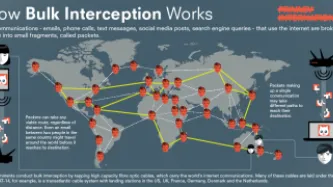Advanced Search
Content Type: Examples
As the long Minnesota winter came to an end in March 2021, both protesters and police began preparing for the beginning of tunneling work to build the Enbridge Line 3 pipeline. Intended to update the decaying previous structure and double its capacity. Police practiced a variety of crowd control tactics and countering different types of imagined threats, honing their strategies by monitoring social media.
https://theintercept.com/2021/03/23/enbridge-line-3-mississippi-minnesota-police/…
Content Type: Examples
Police in Phoenix, Arizona called leaders of a peaceful protest in October 2020 "targets" while surveilling them with drones, cameras, and vehicles. ABC15 found that police and prosecutors collaborated to charge protesters as a "criminal street gang". Although the charges were later dropped, protest leaders said they had a chilling effect on later protests and caused them to change tactics.
https://www.abc15.com/news/local-news/investigations/protest-arrests/phoenix-police-called-protesters-…
Content Type: Examples
Documents acquired under the Government Information (Public Access) Act 2009 reveal that staff and student protests against cuts at the University of Sydney were surveilled by both the university administration and police, who have been widely criticised for using excessive force at education protests. The university administration conducted "risk reviews" of protests and looked for links between education protest organisers and other political organisations. Emails include screenshots of…
Content Type: Examples
Over 2020, EFF supported the right to protest without being surveilled by bringing lawsuits, offering protesters legal support, teaching protesters surveillance self-defence, and providing tools for people on the ground to use to determine what equipment their local police departments are using to spy on activists. Via public records requests, EFF discovered that the San Francisco Police Department gained access to over 400 cameras belonging to the Union Square Business Improvement District to…
Content Type: Examples
When Dallas police posted on Twitter asking for videos of the protests taking place after George Floyd's killing, a flood of videos and images of K-pop stars were uploaded to its anonymous iWatch Dallas tip-off app. Law enforcement can call on vast numbers of networked cameras - from cars, food and retail chains that are typically willing to share with police, law enforcement agencies' own networks of surveillance and body cameras as well as object and face recognition software, protesters and…
Content Type: Examples
Despite having promised in 2016 not to facilitate domestic surveillance, the AI startup Dataminr used its firehose access to Twitter to alert law enforcement to social media posts with the latest whereabouts and actions of demonstrators involved in the protests following the killing of George Floyd. Dataminr's investors include the CIA and, previously, Twitter itself. Twitter's terms of service ban software developers from tracking or monitoring protest events. Some alerts were sourced from…
Content Type: Examples
Following the January 6 invasion of the US Capitol Building, federal law enforcement used a wide variety of surveillance technologies to track down participants, including facial recognition, licence plate readers, policy body cameras, and cellphone tracking. While many of the people being tracked and charged are members of white supremacist groups, human rights organizations such as ACLU and EFF are concerned that the level of surveillance was excessive and poses a threat to peaceful protests…
Content Type: Examples
New data emerged in January 2021 to show that the National Guard deployment of more than 43,350 troops during the nationwide demonstrations following the killing of George Floyd was far more extensive than had been realised, and far greater than the 6,200 troops deployed at the Capitol during the forewarned insurrection. At least 20 military surveillance and reconnaissance helicopters flew over protests in Philadelphia, Minneapolis, Atlanta, and Washington DC, raising concerns about the data…
Content Type: Examples
Peruvian police have used force, arbitrary arrests, undercover infiltrators, tear gas, and forced disappearance against marchers protesting the removal of president Martín Vizcarra. Three protesters have been killed, more than 60 have disappeared, and hundreds have been injured. While the traditional media has either ignored the protests or depicted them as criminal, social media and the internet have been crucial in documenting police abuses via shared images and video. Police have begun using…
Content Type: Examples
Hundreds of emails and documents obtained in response to a freedom of information request by BuzzFeed News show that US federal agents monitored social media for information on planned Black Lives Matter demonstrations in Minneapolis, Washington DC, Los Angeles, and other cities. Researchers and activists (such as EFF) warned that technology-driven surveillance of protesters could set a dangerous precedent and chill assembly and speech, particularly in the case of Black Lives Matter. The…
Content Type: Examples
Human rights activists and Democratic members of the US Congress wrote to top law enforcement officials in the Trump administration to demand they cease surveilling Americans engaging in peaceful protests. Trump and others in his administration called those protesting the killing of George Floyd "domestic terrorists" and "anarchists". Recent efforts to surveil Americans have included facial recognition, automated licence plate readers, and Stingrays, as well as spy planes and drones.
https://…
Content Type: Examples
During the Black Lives Matter protests of summer 2020, US police took advantage of a lack of regulation and new technologies to expand the scope of people and platforms they monitor; details typically emerge through lawsuits, public records disclosures, and stories released by police department PR as crime prevention successes. A report from the Brennan Center for Justice highlights New York Police Department threats to privacy, freedom of expression, and due process and the use of a predator…
Content Type: Advocacy
Content Type: Video
<br />
Biometric data collection and use in the name of countering terrorism has been accelerating around the globe, often abusively, without being effectively regulated or subject to accountability mechanisms
This week we talk to Fionnuala Ní Aoláin, UN Special Rapporteur on Human Rights & Counter-Terrorism, Nina Dewi Toft Djanegara about biometrics in Afghanistan and Iraq, and Keren Weitzberg about uses in Somalia and Palestine.
Links
Read more about uses in Iraq…
Content Type: Examples
Amid a chaotic rollout of the national vaccination plan, the Italian Federation of General Practitioners (FIMMG) and some regions in Italy are resorting to algorithms to more efficiently prioritise who gets vaccinated against COVID-19.
AlgorithmWatch documented the adoption of automated decision-making (ADM) systems to determine COVID-19 vaccination priority orders both by the Italian Federation of General Practitioners and by regional authorities in Lombardy, Valle d’Aosta, and Piedmont. More…
Content Type: Report
In this briefing, Amnesty International, PI and The Centre for Research on Multinational Corporations (SOMO) discuss the corporate structure of NSO group, one of the surveillance industry's well-known participants. The lack of transparency around NSO Group’s corporate structure and the lack of information about the relevant jurisdictions within which it operates are significant barriers in seeking prevention of, and accountability for, human rights violations reportedly linked to NSO Group’s…
Content Type: Report
In Somalia, international entities like the US Department of Defense (DoD) and intergovernmental organizations such as the United Nations (UN) have used biometrics in the name of counterterrorism, collecting and indefinitely storing biometric data, frequently in the absence of full disclosure or appropritate regulation. These biometric initiatives have had dubious benefits and known detrimental effects on local populations. Nevertheless, most Somalis have little knowledge or say over how their…
Content Type: Report
In Afghanistan and Iraq, the U.S. Department of Defense developed its biometric program in confluence with US military operations in. Its expansion was tightly linked to the goals of military commanders during the “War on Terror”: to distinguish insurgents and terrorists from the local civilian population. This research shows how the DOD’s biometric programme was developed and implemented without prior assessment of its human rights impact and without the safeguards necessary to prevent its…
Content Type: Report
In Israel/Palestine, the Israeli government has been deploying biometrics, including cutting-edge facial recognition technology, in the name of counter-terrorism. The Israeli state routinely surveils and severely restricts Palestinians’ freedom of movement using myriad technologies, including biometrics, which result in furthering the policies of systemic segregation. Since many Palestinians live under Israeli occupation, they have little control over the way their sensitive data is turned…
Content Type: Long Read
Since the September 11th attacks, decision makers across the globe have embraced overreaching surveillance technologies. The global “War on Terror” ushered in and normalized an array of invasive surveillance technologies. Collection and storage of biometrics data and the application of statistical methods to such data have been touted as uniquely suited to twenty-first century threats. Yet, biometrics technologies are not seamless, panoptic technologies that allow for perfect control. They can…
Content Type: Long Read
The Grand Chamber of the European Court of Human Rights ruled that the UK government’s historical mass interception program violates the rights to privacy and freedom of expression. The Court held that the program “did not contain sufficient “end-to-end” safeguards to provide adequate and effective guarantees against arbitrariness and the risk of abuse.” As a result the Court ruled that UK law "did not meet the “quality of law” requirement and was therefore incapable of keeping the “…
Content Type: Long Read
Summary
This case began in the UK in 2013, following Edward Snowden’s revelations that UK’s GCHQ was secretly intercepting, processing, and storing data concerning millions of people’s private communications, even when those people were of clearly of no intelligence interest (the ‘Tempora’ programme). It was also revealed that the UK government was accessing communications and data collected by the USA’s National Security Agency and other countries’ intelligence agencies. All of this was…
Content Type: Long Read
On 25 May 2021, the European Court of Human Rights issued its judgment in Big Brother Watch & Others v. the UK. Below, we answer some of the main questions relating to the case.
After our initial reaction, below we answer some of the main questions relating to the case.
NOTE: This post reflects our initial reaction to the judgment and may be updated.
What’s the ruling all about?
In a nutshell, one of the world’s most important courts, the Grand Chamber of the European Court of Human…
Content Type: Press release
The Grand Chamber of the European Court of Human Rights has today ruled that UK mass surveillance laws violate the rights to privacy and freedom of expression.It found that:The UK’s historical bulk interception regime violated the right to privacy protected by Article 8 of the European Convention on Human Rights and freedom of expression, protected by Article 10. Particularly it found that:the absence of independent authorisation,the failure to include the categories of selectors in the…
Content Type: Press release
Privacy International (PI), together with Hermes Center for Transparency and Digital Human Rights, Homo Digitalis and noyb - the European Center for Digital Rights, has today filed a series of legal complaints against Clearview AI, Inc. The facial recognition company claims to have “the largest known database of 3+ billion facial images”. The complaints were submitted to data protection regulators in France, Austria, Italy, Greece and the United Kingdom.
As our complaints detail, Clearview AI…















